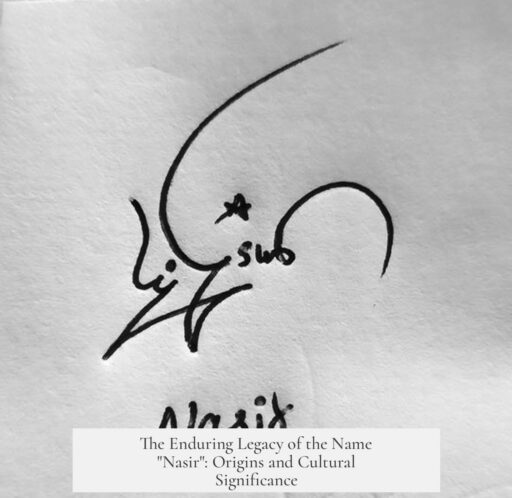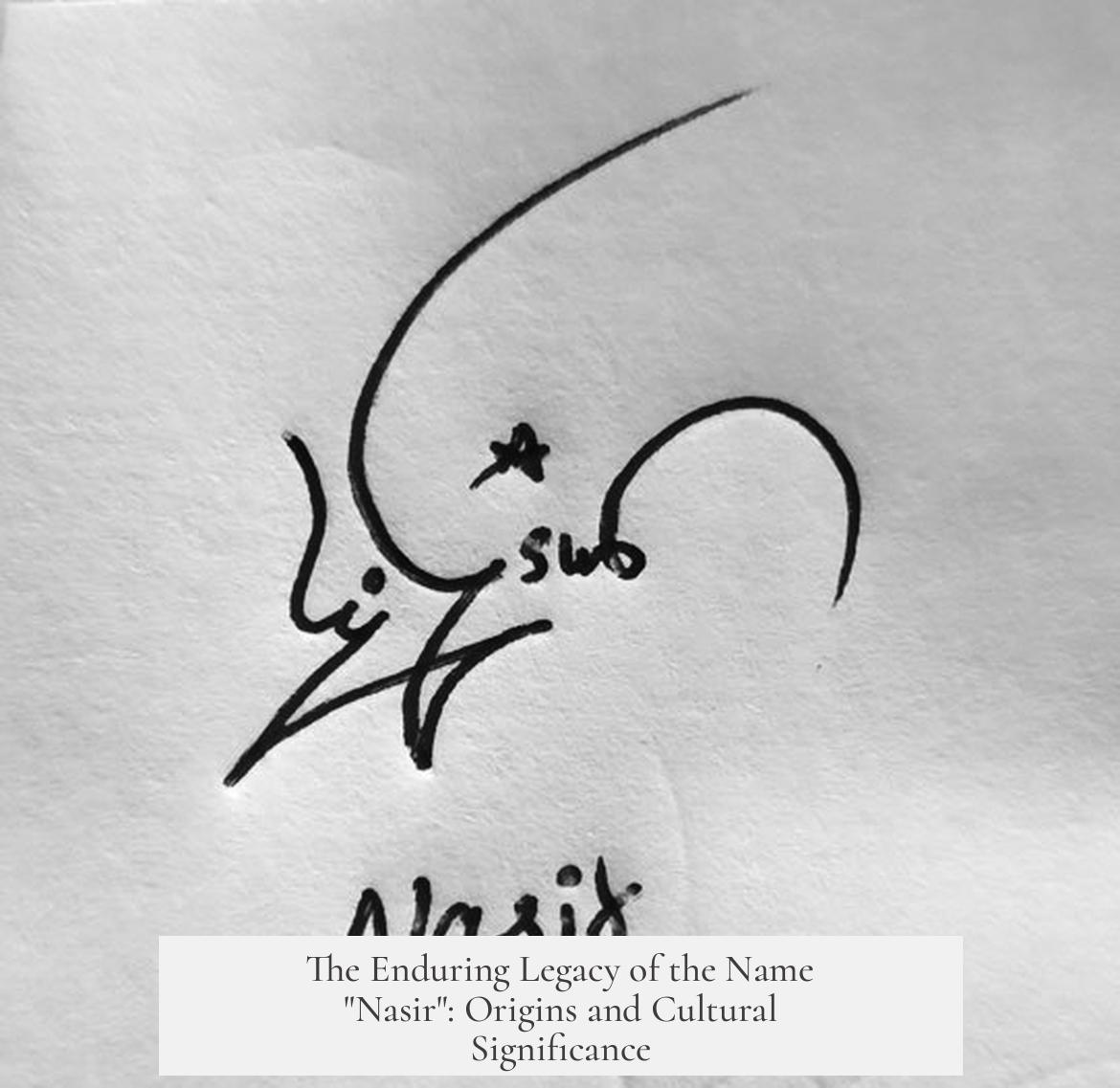The name “Nasir” has survived for millennia due to its deep roots in the Semitic linguistic and cultural tradition, originating from an ancient and robust root that conveys protection and help. Its early recorded form appears in East Semitic languages like Akkadian, particularly in the theophoric name “Ea-Nasir,” linking it to divine protection. The name’s continued use and evolution in Arabic, alongside its Quranic connection to the “Anṣār” (the Prophet Muhammad’s early supporters), have preserved its relevance. The persistence of the root NṢR across various Semitic languages ensures that “Nasir” remains both meaningful and widely used today.

The origin of “Nasir” traces back to the Akkadian language, an ancient East Semitic tongue used in Mesopotamia. While reconstructing Akkadian phonetics is challenging, scholars agree on the consonantal root N-S-R, which is common across Semitic languages. Vowels are less certain but reconstructions typically suggest a pronunciation close to “Nāṣir,” emphasizing the first vowel. The root derives from a proto-Semitic word broadly linked to notions of guarding or assisting.
The earliest prominent bearer of this root appears in the name “Ea-Nasir.” Here, “Ea” references a Sumerian god of water, associated with wisdom and creation, while “Nāṣir” relates to protection or defense. This theophoric name illustrates how the root formed part of divine names, showing its early significance in social and religious contexts. The usage extends beyond names, reflecting the value placed on aid and protection in ancient societies.

- Linguistic Roots: The root NṢR consistently conveys protection, help, or warding off harm, central to cultural values across Semitic peoples.
- Akkadian Use: “Ea-Nasir” exemplifies early use in East Semitic theophoric naming traditions, blending deity names with protective qualities.
- Evolution Across Semitic Languages: The root’s core meaning persists but nuances vary slightly from East to West Semitic languages.
In Arabic traditions, “Nasir” holds a significant place. The Qur’an uses the term “Anṣār” (plural of Nāṣir) for the early supporters of the Prophet Muhammad in Medina. This historical and spiritual connection reinforces the name’s prestige and continued relevance in Islamic culture. Arabic speakers often use “Nasir” as a given name, honorific title, or part of compound names such as “Nāṣir al-Dīn” (“Defender of the Faith”) or “Nāṣir al-Dawla” (“Defender of the State”). Such titles highlight the social esteem associated with the name throughout history.
The name’s survival also owes much to widespread pre-Islamic and later usage across various Semitic-speaking regions. Beyond Arabic, forms of the root occur in Old Arabic, Nabatean, Palmyrene, and other dialects. These examples demonstrate the name’s adaptation through changing linguistic and cultural landscapes. In theophoric names, including those referencing now-lost deities, the root maintained its semantic power even where the original religious context faded.
Its survival over centuries includes:
| Period/Region | Form and Use | Meaning |
|---|---|---|
| Akkadian/East Semitic | “Ea-Nasir” (theophoric) | Protector, divine guardian |
| Pre-Islamic/Old Arabic | Root NṢR in names and diminutives | Aid, help |
| Arabic/Islamic Tradition | “Nāṣir” and “Anṣār” (plural) | Supporter, defender of faith and community |
The consistent core concept of “help” or “protection” sustains the name’s attractiveness. It remains meaningful and respected because societies continuously value those who protect or support others. This semantic durability encourages parents to give the name across generations.
Key takeaways:
- The name “Nasir” originates from an ancient Semitic root NṢR meaning protector or helper.
- It appears early in Akkadian, particularly in the theophoric name “Ea-Nasir,” linking it to divine protection.
- Arabic and Islamic traditions preserve and popularize “Nasir,” connecting it to Prophet Muhammad’s supporters (Anṣār) and honorific titles.
- Its usage spans pre-Islamic and Islamic eras, across various Semitic languages and cultures.
- The name’s survival is due to its semantic relevance, religious significance, and cultural prestige.
How Has the Name “Nasir” Survived for So Long and Where Does It Come From?
The name “Nasir” has survived for millennia because it is deeply rooted in ancient Semitic languages and cultures, carrying strong meanings like “protector,” “helper,” and “supporter” throughout many societies. Its presence in various linguistic traditions and its connection to religious and honorific titles have kept it alive and relevant to this day.
Now, let’s take a fascinating journey to understand the origins, meanings, and survival story of this timeless name.
From Ancient Tablets to Modern Names: The Linguistic Roots of “Nasir”
The earliest known appearance of a name similar to Nasir can be traced back to the ancient Akkadian language. Akkadian, written on clay tablets like those from Ea-Nasir, is an East Semitic language that once thrived in Mesopotamia. Though Akkadian includes many unique phonetic challenges, linguists have confidently identified the consonantal root N-S-R in these texts.
Decoding ancient names isn’t as simple as reading a modern name tag. Semitic languages typically wrote consonants and left vowels out, which forces scholars to *guess* the vowel sounds based on related languages. For example, the name might have been pronounced something like Nāṣir with a stressed “aa” sound (n-aa-sir), though variations like “NaSSIR” or even more exotic forms are possible. This uncertainty doesn’t stop the name from showing significant continuity.
What makes this tricky phonological puzzle truly interesting is how similar the root NṢR is to words in modern Semitic languages, especially Arabic and Hebrew.
Meaning Locked in Three Letters: The Semantics of NṢR
Across multiple Semitic tongues, the root NṢR always revolves around themes of help, protection, and aid.
- In East Semitic languages like Akkadian, NṢR leans heavily on the idea of “protector” or “protection.”
- In Arabic and other West Semitic languages, it veers towards “to help” or “to assist.”
This common semantic thread strongly suggests that names containing NṢR weren’t chosen lightly. They labeled individuals as defenders or supporters—qualities highly prized across time.
For instance, the Akkadian theophoric name Ea-nāṣir paired the name of the god Ea (also known as Enki, the god of water) with NṢR. This means something like “Ea is protector” or “protected by Ea.” Such theophoric naming was a widespread practice, embedding divine protection in personal identities. It helped seal the name’s relevance early on.
How Arabic Tradition and Quranic History Kept Nasir Alive
Fast forward to Classical Arabic and Islamic history — here, Nāṣir finds a fresh new life. The plural form anṣār was famously used to describe the early supporters of Prophet Muhammad in Medina. Being an “anṣār” was a badge of honor, symbolizing loyalty, support, and protection of the new Muslim community.
Because of these Quranic associations, the name Nāṣir grew in popularity, not just as a given name but also as an honorific title. Titles like Nāṣir al-dīn (Protector of the Faith) or Nāṣir al-dawla (Protector of the State) became common, reflecting social prestige and responsibility tied to the name.
Simply put, the religious and cultural weight in Islamic societies offered Nāṣir *both* a linguistic and social umbrella under which it flourished.
The Semitic Spectrum: East to West, Old to New
But the story of Nasir doesn’t end in Arabia. Old Arabic pre-Islamic names also showcase root forms of NṢR, often with slightly shifted meanings, like “aid” or “help.” This points to a broader cultural exchange in the ancient Near East.
Various Semitic dialects—Safaitic, Hismaic, Thamudic, and even Palmyrene—bear witness to this root’s long-lasting presence. For example, a Palmyrene name called Νασραλλαθος references a deity and contains elements similar to NṢR. Though not the exact same modern Arabic name, it signals the root’s broad spread.
This name traversed major historical upheavals. From the Akkadian empires to Old Arabic tribes, through religious shifts and linguistic changes, Nasir survived the fire of history with remarkable resilience.
Why So Many Semitic Naming Traditions Include “Nasir”
| Factor | Explanation |
|---|---|
| Common Root | The root NṢR consistently symbolizes protection/help across cultures and centuries. |
| Theophoric Usage | Names like Ea-nāṣir connected individuals to divine protection, boosting the root’s prestige. |
| Religious Significance | Islamic use of Nāṣir and anṣār created lasting cultural relevance. |
| Honorific Titles | Usage in honorifics and titles (e.g., Nāṣir al-dīn) kept the name active in social discourse. |
| Regional Spread | Presence in East and West Semitic regions ensured survival across geographic and cultural shifts. |
What Can Modern Parents Learn From the Story of Nasir?
Choosing a name like Nasir isn’t just picking a label; it’s linking generations of meanings, history, and identity. It reflects qualities admired for thousands of years: protection, aid, and support. Imagine naming your child something with roots in ancient gods, prophets’ supporters, and noble defenders!
So next time you meet a Nasir, you might glance back 4,000 years—to ancient Mesopotamian scribes, early Arab tribes, and faith-filled defenders of their communities. The name is more than a name; it’s a legacy.
In Conclusion
The name Nasir has endured because it embodies core human values universally admired — protection and help. This is echoed in its earliest Semitic roots in Akkadian, carried on through Old Arabic traditions, and invigorated by Quranic history. Its survival is a linguistic marvel and a cultural testament, beautifully bridging ancient civilizations with the modern world.
Wouldn’t you agree it’s fascinating how a handful of consonants have journeyed through time, cultures, and empires to remain part of our daily lives? Names like Nasir remind us how language and meaning weave human stories across ages.
Where does the name “Nasir” originally come from?
The name “Nasir” comes from a Semitic root “NṢR,” used in ancient East Semitic languages like Akkadian. It means protector or helper, and it appeared in early theophoric names such as Ea-nāṣir, linking it to deities.
Why has the name “Nasir” lasted for thousands of years?
In Arabic, “Nāṣir” relates to the Quranic term “anṣār,” meaning early supporters of Prophet Muhammad. It features in honorific titles like Nāṣir al-dīn, making the name socially important and widely adopted.
What role do theophoric names play in the survival of “Nasir”?
Theophoric names combine a deity’s name with a root like NṢR. Ea-nāṣir is one example. These ancient naming patterns helped preserve “Nasir” by embedding it in religious and cultural traditions across Semitic peoples.
Has “Nasir” changed in meaning across different Semitic languages?
Yes, in East Semitic, it meant “protector,” while in West and Central Semitic languages like Arabic, it shifted to “aid” or “help.” Despite variations, the core sense of support and protection remains.




